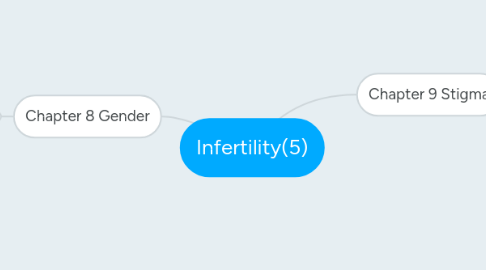
1. Chapter 9 Stigma
1.1. The Woman with the secrets
1.1.1. 39yr old Maisa is married to 46yr old Ahmed. Maisa suffers from blocked fallopian tubes; Ahmed has poor sperm count and motility
1.1.2. After convincing Ahmed that IVF was fine, Maisa became pregnant after second cycle
1.1.3. They kept the pregancy a secret, but began telling people, but after spreading their happiness Maisa lost her baby; believed through envy of another infertile woman
1.2. The "Top Secret" Stigma
1.2.1. IVf in Egypt performs double stigmatization; overcoming health condition, and secrecy and suffering
1.2.2. Stigma is an attribute that makes someone different from others
1.2.3. infertile women discriminated against
1.2.4. infertile men rarely taunted or feel under marital threat
1.2.5. Infertility is a private or personal matter and IVF treatment seeking is a powerful source of stigma
1.3. Dilemmas of disclosure
1.3.1. to tell or not to tell is the main question, then to tell "whom"
1.3.2. Egyptian patients limit their disclosures to a trusted few
1.3.3. good experiences only spread through word of mouth through a family member or friend
1.3.4. disclosure of secrecy all delt with deep cultural significance
1.4. The Stigma of support
1.4.1. In Egypt, the notion of "patient empowerment" through organized groups has not yet to take hold
1.4.2. Egyptian women worried about lack of anonymity in patient support groups
1.4.3. Egyptian women feel groups would exacerbate rather than alleviate their own sufferring
2. Chapter 8 Gender
2.1. Man who replaced his wife
2.1.1. Moustafa, 43yr old lawyer suffered from severe male-factor infertility
2.1.2. After going through many unsuccessful trials with his wife Hala, he felt too pressured by her, and divorced her and remarried to a younger Shahira
2.1.3. Shahira is now pregnant with twins because of ICSI and Moustafa lets people think he childless first marriage was because of Hala
2.2. Femininities, masculininities, and child desire
2.2.1. In Egypt no adult admits to not wanting children
2.2.2. The desire for IVF or ICSI couples seeking twin or triplets show desire for a complete family or a child of each sex
2.2.3. Women in Egypt feel motherhood is a natural part of life, without it, they feel incomplete
2.2.4. Men without a family partriachy are looked at as weak, and encouraged to find other wives
2.3. Conjugal Connectivity
2.3.1. In Egypt, marriage is highly valued and normatively upheld institution
2.3.2. remaining single with multiple sexual partners gets one socially penalized
2.3.3. Marriage is the purpose for procreation and family building
2.3.4. Marriages are typically arranged, and love is to emerge after marriage
2.3.5. For marital success and happiness, women seek religiosity in men
2.4. Marriage and divorce(ICSI age)
2.4.1. Remaining married to an infertile man is no longer a guarantee
2.4.2. masculine hope and technological dreams with infertile men lie with younger wives
2.4.3. Women can find out prior to marriage if male is infertile or has an STD
